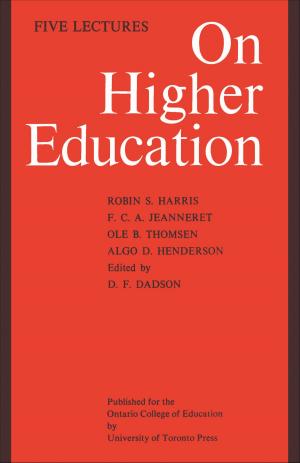Knowledge and Practice in Mayotte
Local Discourses of Islam, Sorcery and Spirit Possession
Nonfiction, Social & Cultural Studies, Social Science, Folklore & Mythology, Anthropology| Author: | Michael Lambek | ISBN: | 9781442638617 |
| Publisher: | University of Toronto Press, Scholarly Publishing Division | Publication: | October 4, 1993 |
| Imprint: | Language: | English |
| Author: | Michael Lambek |
| ISBN: | 9781442638617 |
| Publisher: | University of Toronto Press, Scholarly Publishing Division |
| Publication: | October 4, 1993 |
| Imprint: | |
| Language: | English |
On the East African island of Mayotte, Islam co-exists with two other systems of understanding and interpreting the world around its inhabitants: cosmology and spirit-mediumship. In a witty, evocative style accessible to both the specialist and non-specialist reader, Michael Lambek provides a significant contribution to writing on African systems of thought, on local forms of religious and therapeutic practice, on social accountability, and on the place of explicit forms of knowledge in the analysis of non-western societies.
The "objectified" textual knowledge characteristic of Islam and of cosmology is contrasted with the "embodied" knowledge of spirit possession. Lambek emphasizes the power and authority constituted by each discipline, as well as the challenge that each kind of knowledge presents to the others and their resolution in daily practice. "Disciplines" are defined as an organized body of practitioners or adepts, a concept precise and useful when applied to the contexts of Lambek's own research and equally so in the study of comparable environments elsewhere.
Essential reading for those interested in the comparative study of Islamic societies, Lambek's argument directly contributes to the main anthropological arguments of the day concerning the social and cultural basis of systems of knowledge and ethnographic strategies for depicting them.
On the East African island of Mayotte, Islam co-exists with two other systems of understanding and interpreting the world around its inhabitants: cosmology and spirit-mediumship. In a witty, evocative style accessible to both the specialist and non-specialist reader, Michael Lambek provides a significant contribution to writing on African systems of thought, on local forms of religious and therapeutic practice, on social accountability, and on the place of explicit forms of knowledge in the analysis of non-western societies.
The "objectified" textual knowledge characteristic of Islam and of cosmology is contrasted with the "embodied" knowledge of spirit possession. Lambek emphasizes the power and authority constituted by each discipline, as well as the challenge that each kind of knowledge presents to the others and their resolution in daily practice. "Disciplines" are defined as an organized body of practitioners or adepts, a concept precise and useful when applied to the contexts of Lambek's own research and equally so in the study of comparable environments elsewhere.
Essential reading for those interested in the comparative study of Islamic societies, Lambek's argument directly contributes to the main anthropological arguments of the day concerning the social and cultural basis of systems of knowledge and ethnographic strategies for depicting them.















